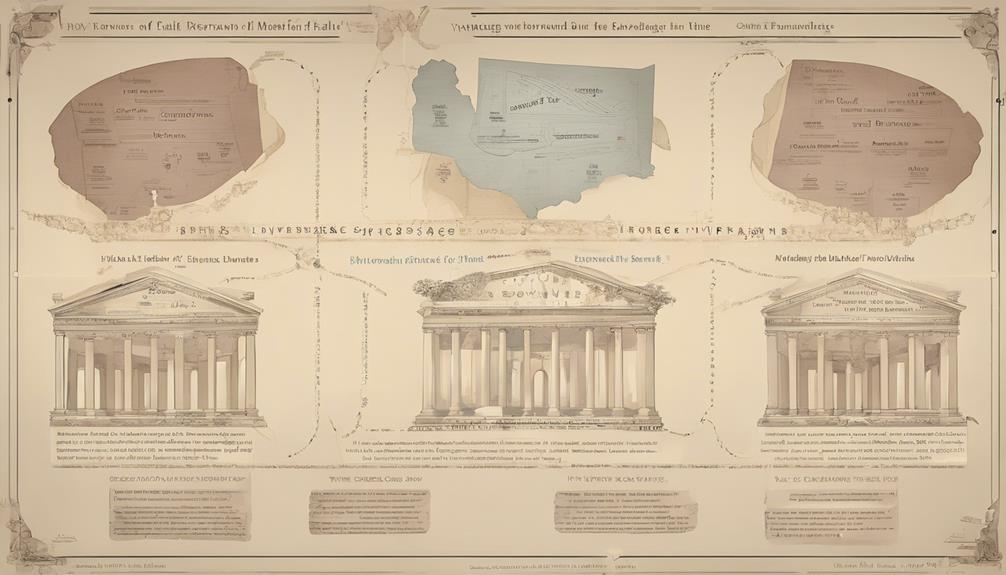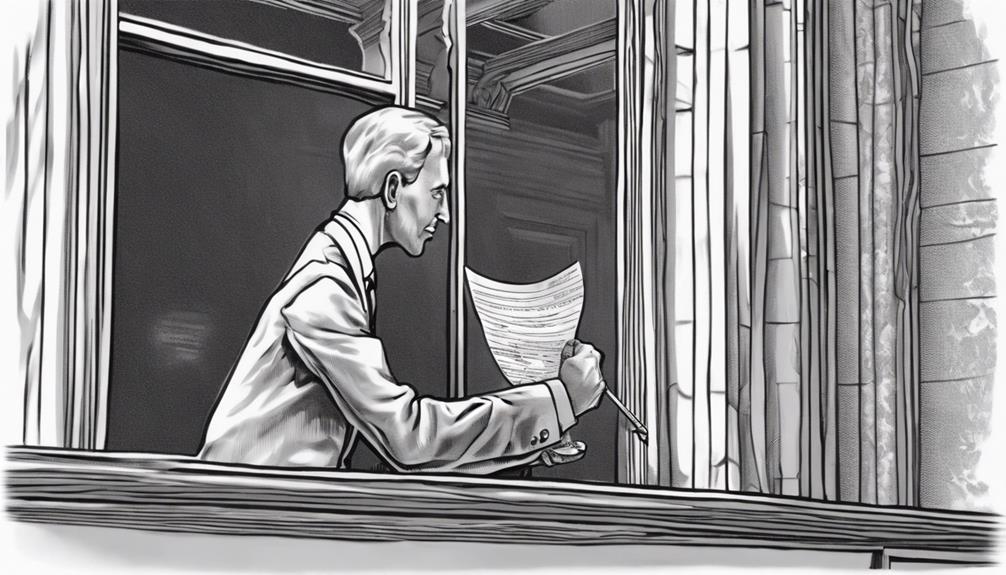As you initiate the divorce process in Pennsylvania, think of the ten steps as markers along a winding road, guiding us through the intricate legal system of ending a marriage. From establishing residency to comprehending the grounds for divorce, each step is crucial in untangling the ties of matrimony.
But what happens when the road takes an unexpected turn, or emotions run high? Stay with us to discover how to navigate these complexities and ensure a smooth passage through the divorce process in the Keystone State.
Key Takeaways
- Understand the types of divorce in Pennsylvania: fault-based and no-fault options.
- Choose between uncontested and contested divorce based on agreement with the spouse.
- File for divorce by submitting a joint petition or a complaint for acceptance of service.
- Plan post-divorce adjustments like updating legal documents and seeking counseling for emotional support.
Residency Requirements
To initiate the divorce process in Pennsylvania, it’s essential to meet the state’s residency requirements, which mandate that at least one spouse must have resided in the state for a minimum of six months. When filing for divorce, it’s crucial to ensure that this residency criterion is satisfied.
The filing can take place in the county where either spouse currently resides or where they lived during the marriage. If the couple has been separated for six months or more, they can file for divorce in the county of either party’s current residence. However, if the separation period is less than six months, the divorce should be filed in the county where the plaintiff resides.
Understanding and adhering to these residency requirements are fundamental steps in the divorce process in Pennsylvania. By meeting these criteria, individuals can proceed with the filing accurately and within the legal framework of the state. It’s advisable to consult with a legal professional to ensure all requirements are met before initiating the divorce proceedings.
Grounds for Divorce

Meeting the residency requirements sets the foundation for understanding the grounds for divorce in Pennsylvania, which encompass both no-fault options like mutual consent or two-year separation, as well as fault-based grounds such as adultery, desertion, and cruelty.
When considering the legal grounds for divorce, it’s essential to weigh the differences between fault-based and no-fault options. No-fault grounds, like mutual consent or separation, focus on the irretrievable breakdown of the marriage without the need to prove specific wrongdoing by either party. On the other hand, fault-based grounds require demonstrating misconduct, such as adultery or cruelty, which can complicate the divorce process and prolong its duration.
Understanding the grounds for divorce is crucial as it plays a significant role in determining the legal approach to ending a marriage in Pennsylvania. Whether opting for a no-fault or fault-based divorce, the choice of grounds can impact the legal proceedings, timelines, and final outcomes. It’s important to carefully consider these grounds and their implications when initiating the divorce process to ensure a smoother and more efficient transition.
No-Fault Vs. Fault-Based Divorce
When considering divorce in Pennsylvania, it’s crucial to understand the differences between no-fault and fault-based grounds. No-fault divorces can be quicker and simpler, based on mutual consent or a two-year separation.
On the other hand, fault-based divorces require proof of specific grounds such as adultery or cruelty, making the process more complex and time-consuming.
No-Fault Divorce Benefits
No-fault divorces in Pennsylvania offer a more streamlined and efficient process compared to fault-based divorces. When opting for a no-fault divorce, couples benefit from the following:
- Mutual Consent: Both parties can agree to end the marriage without assigning blame, making the process smoother and less adversarial.
- Shorter Separation Period: In cases where mutual consent isn’t possible, a two-year separation period can suffice, allowing for a quicker resolution compared to fault-based grounds.
- Simplified Proceedings: No-fault divorces don’t require proving specific fault grounds like adultery or cruelty, reducing the complexity and emotional toll on both parties.
Choosing a no-fault divorce can lead to a more amicable and efficient dissolution of marriage in Pennsylvania.
Fault-Based Divorce Grounds
Moving from the benefits of a no-fault divorce, understanding the fault-based grounds for divorce in Pennsylvania provides insight into the nuances of marital dissolution processes. In Pennsylvania, fault-based grounds for divorce include adultery, desertion, cruel treatment, bigamy, and imprisonment. While no-fault divorces often require mutual consent or a two-year separation period, fault-based grounds necessitate providing evidence, making the process more complex. Here is a comparison between fault-based and no-fault divorce grounds in Pennsylvania:
| Fault-Based Grounds | No-Fault Grounds |
|---|---|
| Adultery | Mutual Consent |
| Desertion | Two-Year Separation |
| Cruel Treatment | |
| Bigamy | |
| Imprisonment |
Understanding these distinctions is vital when deciding on the approach to take in your divorce proceedings.
Choosing the Right Approach
To determine the most suitable approach for your divorce in Pennsylvania, it’s essential to weigh the advantages and complexities of both fault-based and no-fault divorce options. When choosing the right approach, consider the following:
- No-Fault Grounds for Divorce: No-fault divorce in Pennsylvania can be obtained either through mutual consent or after a two-year separation period, making it a simpler and quicker option.
- Fault-Based Divorces: Pursuing a fault-based divorce in PA requires establishing grounds such as adultery, cruelty, desertion, or imprisonment, which can lead to a more contentious and lengthy process.
- Choosing the Right Approach: Understanding the differences between the two options is crucial in deciding whether to proceed with a no-fault or fault-based divorce in Pennsylvania.
Filing for Divorce: Uncontested

When seeking an uncontested divorce in Pennsylvania, both spouses must come to an agreement on critical factors such as asset division, child custody, and support. Filing for an uncontested divorce generally involves submitting a joint petition or one spouse filing a complaint with an acceptance of service from the other. This process is typically quicker and less costly compared to contested divorces.
In Pennsylvania, uncontested divorces can be finalized without a court hearing if all necessary documents are in order. It’s essential to have a marital settlement agreement that outlines the agreed-upon terms, as this can help streamline the uncontested divorce process. This agreement should cover areas like property division, spousal support, child custody, and visitation rights.
Filing for Divorce: Contested

In a contested divorce filing in Pennsylvania, disputes requiring court intervention to resolve typically arise regarding issues such as property division, alimony, child custody, and support. When facing a contested divorce, the following steps are essential:
- Court Intervention: Contested divorces necessitate court involvement to settle disagreements. The court will hear arguments from both parties and make decisions on unresolved issues.
- Legal Representation: Legal representation is crucial in contested divorces. Attorneys play a significant role in advocating for individual rights, presenting evidence, and navigating the complex legal procedures.
- Complex Process: Contested divorces are known to be more time-consuming and intricate compared to uncontested cases. The involvement of the court and the need to resolve disputes through legal proceedings can prolong the divorce process.
In a contested divorce, it’s vital to seek legal advice and representation to protect your interests and ensure a fair resolution of the issues in dispute.
Divorce Filing Fees

Navigating through the complexities of a contested divorce in Pennsylvania may lead to considerations concerning the range of filing fees associated with initiating the process. In Pennsylvania, filing fees for divorce typically fall within the range of $100 to $300. However, it’s important to note that court costs may vary depending on the county where the divorce is filed.
Individuals with low income who qualify for a fee waiver may be able to have these costs waived. It’s crucial to understand the fee structure and potential waivers available before starting the divorce process.
Additionally, there may be additional expenses for serving papers, mediation services, or legal representation. Legal representation can significantly impact the overall costs of the divorce process, so it’s advisable to carefully consider whether to hire an attorney.
Being aware of these financial aspects is essential for individuals seeking a divorce in Pennsylvania to make informed decisions throughout the proceedings.
Serving Your Spouse

Properly serving your spouse in Pennsylvania involves ensuring legal notice is provided through methods such as certified mail or personal service. When it comes to serving divorce papers, it’s crucial to adhere to specific guidelines to ensure that the process is legally sound and that your spouse is properly informed of the proceedings.
Here are three essential points to consider when serving your spouse in Pennsylvania:
- Time Frames: Different locations within Pennsylvania may have varying time frames within which divorce papers must be served to your spouse. It’s important to research and understand the specific requirements based on your spouse’s location to avoid delays in the divorce process.
- Methods of Service: Depending on where your spouse is located, different methods of serving divorce papers may be required. Familiarize yourself with the acceptable methods of service to ensure that legal notice is effectively delivered.
- Importance of Proper Service: Properly serving divorce papers isn’t just a procedural formality; it’s a crucial step to ensure that your spouse is aware of the legal proceedings and can respond accordingly. Failure to serve your spouse correctly can lead to complications in the divorce process.
Court Hearings

Preparing for court hearings in a Pennsylvania divorce case involves organizing evidence, testimony, and arguments to present before a judge. These hearings are vital as they address critical issues such as property division and alimony. To ensure a streamlined presentation of information in court, it is helpful to structure your preparation. Consider the following table as a guide:
| Preparation for Court Hearings | Tips |
|---|---|
| Organize Evidence | Collect all relevant documents such as financial records, property deeds, and any agreements. |
| Prepare Testimony | Practice presenting your key points clearly and concisely to support your case. |
| Understand Property Division | Familiarize yourself with Pennsylvania laws on equitable distribution of assets. |
| Alimony Considerations | Be prepared to discuss factors influencing alimony awards, like income disparity and duration of marriage. |
| Consult with an Attorney | Seek advice from a qualified attorney to guide you through the court process effectively. |
Court hearings provide the platform to address contested issues, leading to a resolution on matters like property division and alimony. It is crucial to attend these hearings or have legal representation to ensure your interests are protected and decisions are made in compliance with the law.
Divorce Decree

As we conclude court hearings in a Pennsylvania divorce case, the next significant step is obtaining the divorce decree, a final court order that officially terminates the marriage. This document is crucial as it outlines the specifics of the divorce settlement, including property division, alimony, child custody, and support arrangements.
Here are three key points to consider regarding the divorce decree:
- Legal Finality: The divorce decree is issued by the court once all issues in the divorce have been resolved or adjudicated. It serves as a legally binding document that both parties must adhere to regarding their rights and responsibilities post-divorce.
- End of Marriage: The divorce decree marks the official end of the marriage. It provides closure to the divorce process in Pennsylvania and signifies the formal dissolution of the marital union.
- Enforcement: The terms outlined in the divorce decree, especially those related to property division, are enforceable by law. It’s essential for both parties to understand and comply with the directives laid out in this final court order.
Post-Divorce Considerations

Upon finalizing a divorce in Pennsylvania, the consideration of post-divorce arrangements and adjustments becomes paramount. One crucial aspect to address is estate planning, which often involves updating legal documents such as wills, trusts, and powers of attorney to reflect changes in circumstances post-divorce. Additionally, reviewing and updating beneficiary designations on insurance policies and retirement accounts is essential to ensure that assets are distributed according to current intentions.
Furthermore, adjusting estate planning and financial accounts to align with the new post-divorce situation is highly recommended. Evaluating and potentially modifying existing custody and visitation arrangements is another significant post-divorce consideration to ensure the well-being of all parties involved, especially any children.
It is also advisable to seek counseling or therapy to cope with any emotional challenges stemming from the divorce and to help adjust to the new post-divorce life. By addressing these post-divorce considerations diligently, individuals can navigate this transitional period more smoothly and effectively.
Frequently Asked Questions
What Is the Fastest Way to Get a Divorce in Pa?
The quickest way to get a divorce in PA involves an uncontested, no-fault process. By agreeing on key issues like custody and support, couples can speed up the 4-6 month timeline. Mutual consent or a two-year separation period are required.
What Is the First Step in Filing for Divorce in Pa?
First things first, establishing residency is key! Make sure one of you has lived in PA for at least six months. Prove it with a driver’s license or bills. File in the right county, and you’re on your way!
How Quickly Can a Divorce Be Finalized in Pennsylvania?
In Pennsylvania, a divorce can be finalized in about 4-12 months, depending on whether it’s uncontested or contested. The chosen grounds for divorce impact the speed. Understanding the process and requirements can help expedite the timeline.
Can You Get Divorced in PA Without Going to Court?
Yes, in Pennsylvania, we can get divorced without going to court if both parties agree on terms. Uncontested divorces often allow for a streamlined process, potentially avoiding court appearances. Utilizing mediation or collaborative methods can help resolve issues efficiently.
Conclusion
In conclusion, navigating the divorce process in Pennsylvania requires patience, persistence, and proper preparation. By understanding the residency requirements, grounds for divorce, and filing procedures, individuals can streamline the process and achieve a smoother transition.
Remember, seeking legal advice and considering post-divorce considerations can help ensure a successful outcome. Stay strong, stay savvy, and secure your divorce decree with these 10 quick steps in Pennsylvania!










